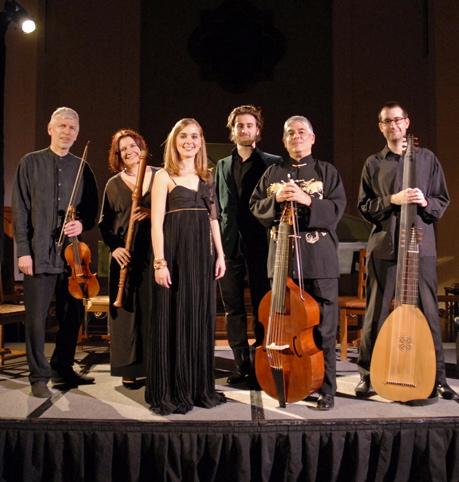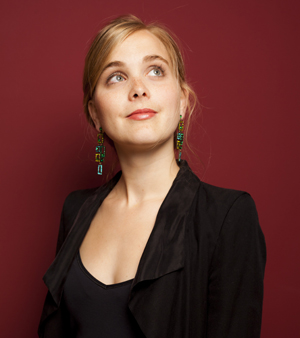Soprano Fioretti shines in Miami Bach Society’s trip to Versailles
The extravagance of French Baroque music during the reign of King Louis IV was the focus of the Miami Bach Society’s season-opening program on Thursday night.
Fuoco e Cenere, the French group that has appeared on several occasions at the organization’s annual Tropical Baroque Festival, returned with “Versailles: The Improbable Dream.” The concert highlighted the pivotal role of music throughout the monarch’s daily schedule, traversing the chapel, royal dinners, the theater and the elegant gardens surrounding the palace.
Comber Hall at the Church of the Little Flower in Coral Gables was a near-perfect setting for the four instrumentalists and soprano soloist. Large enough to accommodate the substantial audience but intimate enough for the period instrument’s timbres to resound with clarity and directness, the room was an inviting space that enhanced the musical offering.
At a 2013 concert by this ensemble on a memorably frigid South Florida night, the young French soprano Julie Fioretti substituted at short notice for the originally scheduled vocal soloist. Singing works by obscure composers that she had learned in a matter of days, the young singer impressed with the expressiveness of her bright voice and her poise and professionalism.
Fioretti returned for a textbook demonstration of stylish Baroque singing in a repertoire that ranged from festive and mildly flirtatious to highly dramatic and theatrical.
Symbolizing the monarch’s greeting of the rising morning sun, the lilting melody of Michel Lambert’s “Vos mépris chaque jour” showcased the sweet timbre of Patricia Lavail’s recorder. Fioretti’s attractive light sound, exquisite shaping of decorative lines and idiomatic affinity for the idiom set the evening’s thematic thread and musical momentum from the start. Her effortless high register was on display in a charming, melodically inspired aria from Louis Nicolas Clérambault’s Apollon.
Turning to the court composers’ sacred scores, Fioretti opened Francois Couperin’s Deuxième lecon des ténèbres with a wordless vocalize that seemed to emerge from another world. Between sections of the church cantata, Fioretti extinguished the lit candles placed in front of the performance platform. Singing without vibrato in a striking white gown, Fioretti brought passion and vivid emotion to Couperin’s mix of reverence and drama. Her high notes emerged free and bereft of scooping between registers. Switching gears, she brought finely pointed elegance to the charming vocal lines of “Chanson et Gavotte d’Aréthuse” from Marc-Antoine Charpentier’s opera Actéon.
All of this was a mere prelude to the evening’s vocal tour de force. André Campra’s dramatic cantata Didon is a roller-coaster of emotions. The score traces the Carthaginian queen Dido’s journey from joy to despair and eventual suicide as her lover Énée leaves to battle for the conquest of Italy.
Fioretti imbued Campra’s cascade of lovely melodic writing with theatrical power in the rhetorical recitative sections and conveyed the queen’s increasing sense of hopelessness despite the music’s rapid fire tempo. The final somber pages were superbly conveyed. A bouncy aria from Jean-Baptiste Lully’s Armide, sung with brilliant dexterity, was the topping on Fioretti’s stellar recital.
Although the soprano commanded much of the audience’s attention, the instrumentalists made potent contributions to this recreation of a unique artistic milieu. Lavail’s tangy sound, so different from the modern flute, captured the zest of Apollo’s entrance from Lully’s Triomphe de l”Amour. Antoine Forqueray’s La Laborde showcased harpsichordist Justin Taylor’s agile fingerwork and delicate registrations. A march by Lully found the combination of recorder and viola da gamba recalling the sonorities of sackbuts and Baroque cornets in David Munrow’s pioneering early music band.
The Gallic graces of Pierre Philidor’s Cinquième Suite for the king’s table were enhanced by Lavail’s purity of tone and ability to sustain the winding paths of a beautiful Sarabande. A robust Gigue in the vein of the Badineire from Bach’s Suite No. 2 for flute was particularly enticing in Lavail’s rendition.
Jay Bernfeld’s mastery of the gamba was no less outstanding. In both the Philidore and the intricate variations of Marin Marais’ Les Folies d’Espagne, Bernfeld’s deep tone and deft and incisive phrasing on the seven string version of the cello’s predecessor brought the evening’s biggest ovation for a purely instrumental work. Damien Pouvreau’s therbo was always highly important in supporting Fioretti’s vocal flights.
The Miami Bach Society’s season continues with Donald Oglesby conducting the Miami Collegium Musicum and Bach Society Chamber Players in works by Bach, Boyce and Handel 3 p.m. November 27 at St. Thomas Episcopal Church in Miami. miamibachsociety.org
Posted in Performances
Leave a Comment
Fri Nov 11, 2016
at 1:15 pm
No Comments








